CONTENTS OF
THIS SECTION |
|
India & the Tamil Struggle
for Freedom |
|
For Province, Read Nation - Pramatha
Chauduri, 1920 |
|
Kashmir - a Revolt Against Indian
Military Terror, Arundhati Roy |
|
Tamils: A Trans State Nation - Tamil Nadu |
|
India's Counter Insurgency: Civil
War, 8 October 2009 |
|
'Calling Maoists mad Islamists is
not going to help', 3 October 2009 |
|
Old Habits Die Very Hard - India's Ugly Underbelly - Badri Raina, 19 September 2009 "..Never a day goes by when some senior member of the cabinet does not lambast
"internal challenges to the state." Invariably they have left-wing extremism in
mind... Matter of time, as dominance carries within it the seeds of its own
destruction. Those that everyday swear by democracy while wishing to contain
it cannot succeed..." |
|
Indias's Simmering Revolution: India is 'losing
Maoist battle' says Indian Prime Minister "India's Prime Minister Manmohan Singh says his country is losing the battle
against Maoist rebels.Mr Singh told a meeting of police chiefs from different
states that rebel violence was increasing and the Maoists' appeal was growing." |
|
India Bans Communist Party
of India -Maoist (CPI-M) , 22 June 2009 |
|
India's New-Found Irrelevance - Harsh V. Pant, 23 March 2009 |
|
Center Stage for the Twenty-first Century - Power Plays in the Indian Ocean
- Robert D. Kaplan, 1 March 2009 |
|
US - India - China: Changing Dynamics - the Dollar Courts the Yuan,
21 February 2009 |
|
Hunger in
India States Alarming, 14 October 2008 |
|
Divisions on the Rise in India - Manmohan Singh, 13 October 2008 |
|
Bush signs US-India nuclear bill
8 October 2008 |
|
US approves Indian nuclear deal,
2 October 20008 |
|
Why
Indians Succeed in countries Ruled by Whites, 14 September 2008 |
|
Whither India? Two Views - Top Down and Bottom Up, 14 September 2008 |
|
Empires Don't Build Rivals - Justin Podur
, 5 August 2008 |
|
"India's N-Deal only with the US"
- says US Envoy Nicholas Burns,
1 March 2008 |
|
China hails Sonia's 'milestone' visit, for better ties, 27 October
2007 |
|
60 Years of
Independence: India�s Foreign Policy Challenges - Shyam Saran, 30 August
2007 |
|
Indian economic policy is hijacked by a small elite - Mani
Shankar Iyer , Minister for Panchayati Raj
at the
Confederation of Indian
Industry, 3 May 2007 |
|
Maoist Naxalite attacks in
Central India, 16 March 2007 |
|
US House of Representatives allows export of civilian nuclear fuel to
India, 9 December 2006 |
|
US Senate backs India nuclear deal, November 2006
|
|
India takes the lead in South Asia arms
purchase
, 5 December 2004 |
|
The Buddha Smiled, Nadesan Satyendra, 1998 |
|
United States,
India & Pakistan - Stephen Cohen, 1997 |
|
Military Training as a Tool of
Peacetime Military Diplomacy - B. S. Sachar, 1 September 1993
"..The
paper looks at the manner of conduct of military training cooperation by
India and examines the areas where this cooperation can be suitably enhanced
by adopting a more concerted approach to peacetime military diplomacy, in
consonance with foreign policy..." |
|
The Challenge of Ethnic Conflict India: The Dilemmas of Diversity - Robert L
Hardgrave, 1993 |
|
Irritants to Calibration, Nadesan Satyendra, 1993 |
|
Good Bye, Non Alignment!, Nadesan Satyendra,1993 |
|
India & US - the Calibrated Approach, Nadesan
Satyendra,1992 |
|
Related Offsite Links |
|
Research and Analysis Wing - New Delhi, India |
|
Indian Armed Forces |
|
Institute of Peace & Conflict |
|
Observer Research Foundation |
|
ORF Institute of Security Studies |
|
|
International Relations in the
Age of Empire India: an Empire in Denial
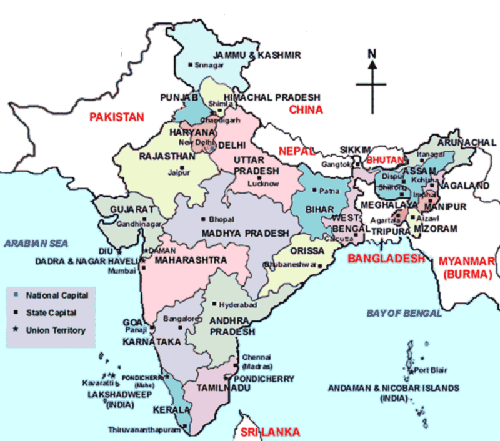
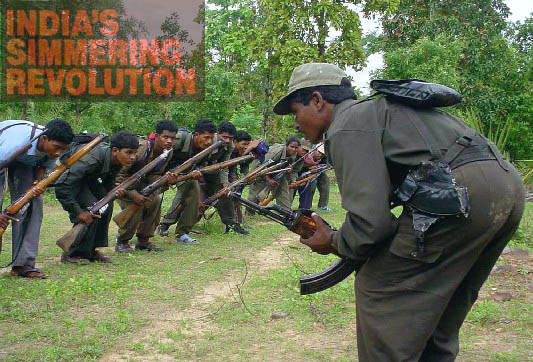
Maoist fighters training in Chattisgarh state in central India in 2006
"..What we�re witnessing is the most successful secessionist struggle
ever waged in independent India � the secession of the middle and
upper classes from the rest of the country. It�s a vertical
secession, not a lateral one. They�re fighting for the right to
merge with the world�s elite somewhere up there in the stratosphere...
to equate a resistance movement fighting against enormous
injustice with the government which enforces that injustice is
absurd. The government has slammed the door in the face of every
attempt at non-violent resistance. When people take to arms,
there is going to be all kinds of violence � revolutionary, lumpen and
outright criminal. The government is responsible for the monstrous
situations it creates...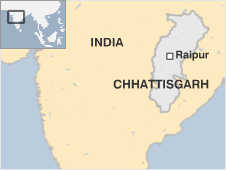 There
is
a
civil war in Chhattisgarh sponsored, created by the Chhattisgarh
government, which is publicly pursing the Bush doctrine: if you�re
not with us, you are with the terrorists. The lynchpin of this war,
apart from the formal security forces, is the
Salva Judum � a government-backed militia of ordinary people forced to become spos
(special police officers). The Indian State has tried this in
Kashmir, in
Manipur,
in Nagaland.
Tens of thousands have been killed - thousands tortured, thousands have disappeared. Any
banana republic would be proud of this record. Now the government wants to import these failed strategies into the heartland... I have no doubt that the Maoists can be agents of terror and
coercion too. I have no doubt they have committed unspeakable
atrocities. I have no doubt they cannot lay claim to undisputed
support from local people � but who can? Still, no guerrilla army
can survive without local support. That�s a logistical
impossibility. And the support for Maoists is growing, not
diminishing. That says something. People have no choice but to align
themselves on the side of whoever they think is less worse.does this mean that people
whose dignity is being assaulted should give up the fight because
they can�t find saints to lead them into battle?. "
'It�s outright war and both sides are choosing their weapons'-
Arundhati Roy
March 2007 There
is
a
civil war in Chhattisgarh sponsored, created by the Chhattisgarh
government, which is publicly pursing the Bush doctrine: if you�re
not with us, you are with the terrorists. The lynchpin of this war,
apart from the formal security forces, is the
Salva Judum � a government-backed militia of ordinary people forced to become spos
(special police officers). The Indian State has tried this in
Kashmir, in
Manipur,
in Nagaland.
Tens of thousands have been killed - thousands tortured, thousands have disappeared. Any
banana republic would be proud of this record. Now the government wants to import these failed strategies into the heartland... I have no doubt that the Maoists can be agents of terror and
coercion too. I have no doubt they have committed unspeakable
atrocities. I have no doubt they cannot lay claim to undisputed
support from local people � but who can? Still, no guerrilla army
can survive without local support. That�s a logistical
impossibility. And the support for Maoists is growing, not
diminishing. That says something. People have no choice but to align
themselves on the side of whoever they think is less worse.does this mean that people
whose dignity is being assaulted should give up the fight because
they can�t find saints to lead them into battle?. "
'It�s outright war and both sides are choosing their weapons'-
Arundhati Roy
March 2007
"... Endless platitudes abound about (Indian) 'national unity' and
the catholicity and durability of 'Indian culture'... (but) our national
identity has not been forged through a definitive articulation of a
national-popular collective will as has been claimed... It seems urgent,
then, that we pose certain crucial and important questions about ourselves:
How are we a 'nation'? What are the historical and cultural markers of our
'nation-hood'? Is our national identity the product of a `national popular
will'?... The Indian state is of course determined to prevent these
questions from being asked. In this context it seems logical that we ask:
What is the 'Indian' nation we seek to preserve? These questions were posed
with great alacrity and boldness by the ideologues of the Dravidian movement
in Tamilnadu (among others) during the early decades of this century..." Interrogating 'India' - a Dravidian Viewpoint -
V.Geetha and S.V.Rajadurai "
"As children, we read in the Hitopodesa that at night birds from all
directions would gather on a shimul tree on the banks of the Godavari. Why?
To cackle for a while and then go off to sleep. Cackle in this context means
to discuss the politics of the birdworld. We, too, in this dark, night time
of India's history go to the Congress meet to cackle for three or four days
and then snore. We can cackle together because, thanks to the education
conferred by the British, we all have the same dialect. I am not saying that
this dialect is all that our lips utter or our minds. All I want to suggest
is that behind the Congress patriotism, there is only one kind of mind and
that mind is bred on English text books. We all have that kind of mind, but
under it is the mind which is individual for all nations and different from
nation to nation. And our civilisation will emerge from the depth of that
mind."
...It is not a bad thing to try and weld many into one but to
jumble them all up is dangerous, because the only way we can do
that is by force. If you say that this does not apply to India,
the reply is that if self determination is not suited to us,
then it is not suited at all to Europe. No people in Europe are
as different, one from another, as our people. There is not
that much difference between England and Holland as there is
between Madras and Bengal. Even France and Germany are not that
far apart."
For Province, Read Nation - Pramatha Chauduri, 1920
"...The
break up of India, if it comes will not come from the efforts of
tamilnation.org.
It will come despite our efforts. It will come from a failure of political
leaders in India to openly recognise that India is today a multi national
empire -
and to recognise the enduring wisdom of the
words of Pramatha Chaudhuri...
"...It is not a bad thing to try and weld
many into one but to jumble them all up is dangerous, because the only
way we can do that is by force. If you say that this does not apply to
India, the reply is that if self determination is not suited to us, then
it is not suited at all to Europe. No people in Europe are as different,
one from another, as our people. There is not that much difference
between England and Holland as there is between Madras and Bengal. Even
France and Germany are not that far apart."
Those concerned to secure the unity of India will need to adopt
a more 'principle centred' approach towards
struggles for self determination
in the Indian region.. ." Tamil Nation & the Unity of India
- Nadesan Satyendra 2001
|
China/India: Cooperation and Competition
- map by Laura Canali
The infrastructural net that increasingly links China to India, Russia
and the Central Asian countries as a bridge for cooperation and a source of
frictions: existing and planned pipelines, location of main oil fields, main
and secondary ports, existing �sea highways� and plans to bypass the Malacca
straits bottleneck, distribution of US military bases in the
Indian Ocean region.
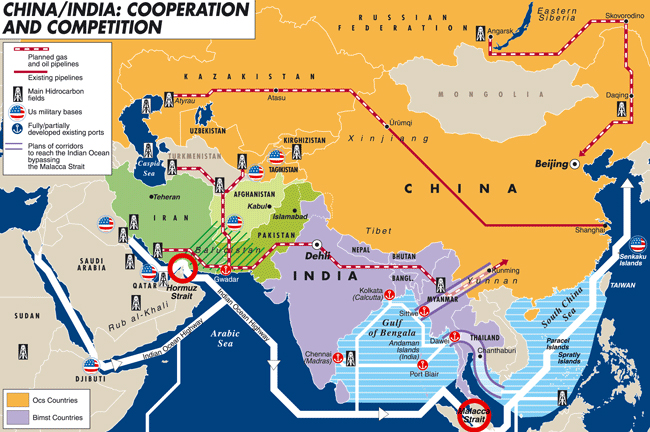
|
How America Wants to Check China�s Expansion
map by Laura Canali
An outline of the new containment strategy America is setting up to curb
Beijing�s geopolitical expansion: allied countries �housing US bases�
America can rely on; hostile ones to be checked; ambivalent or neutral
states to be aware of. Most importantly, strategic countries that aren�t
part of the US strategy yet, and on which Washington�s efforts face an
active Chinese led counteroffensive.
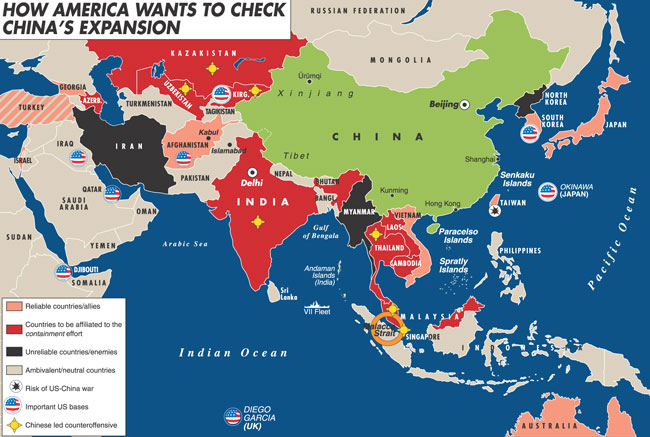 |
|